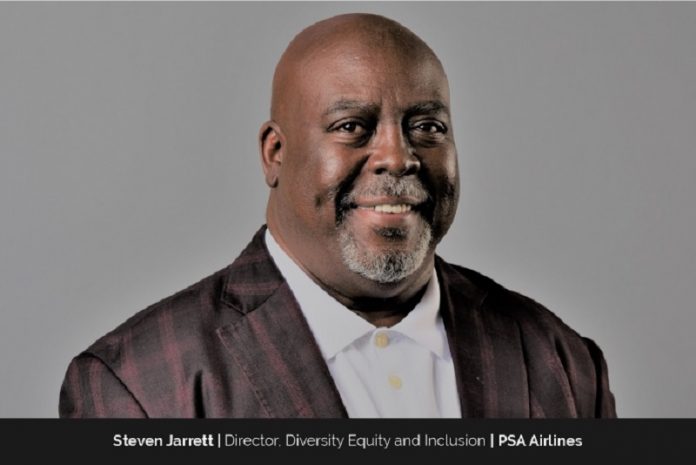PSA Airlines, a wholly owned subsidiary of American Airlines, has always had a commitment to being a diverse and inclusive workplace. However, the killing of George Floyd and the subsequent national protests inspired PSA’s senior leadership team to ask themselves and their employees some tough questions. One of the conclusions from these discussions was to create the position of Director of Diversity, Equity, and Inclusion (DE&I) in 2020. Their leadership team didn’t know all the answers, but they wanted to make progress, and for that, they needed a business-aligned DE&I strategy. As a result, Steve Jarrett became PSA’s first Director of DE&I in 2020 to help the organization develop its strategy. Today, his primary focus is integrating DE&I into PSA’s business relations, culture, and work environment.
A Seasoned Veteran in DE&I Space
Steve’s professional journey in the DE&I space started with IBM, where he was hired as a recruiter, who was also responsible for establishing relationships with minority organizations that proved to be good sources of talent. Even as he continued to grow in his career and his titles changed, his involvement with DE&I never wavered. Either through direct responsibility, board relationships, ties with an external organization, or mentoring, Steve remained embedded in the principles of DE&I. Steve said his current role as PSA’s Director of DE&I is different because it requires him to be a subject-matter expert on behalf of the company. He said that can only be accomplished by being a great listener. Taking the listen-first approach has helped Steve understand how his organization feels about DE&I and provided a more reliable way to gauge the readiness for the changes required to make progress in the DEI space.
“This is critical in creating a business-aligned DEI strategy,” said Steve.
Challenges and the ‘Why’
Steve points out that within organizations, it is “instinctive” for leaders to know why there is a need for recruiting, benefits, and employee relations departments. However, what isn’t instinctive is why you need DE&I.
In some cases, organizations don’t feel that DE&I is something they need to do or necessary, said Steve. Others may get it intellectually and understand the need for it but have difficulty explaining – why they think it is important – to those who are not open to diversity and inclusion.
Steve says that what he has learned to do over the years is to “help establish the why” and “how it leads to what is important to the business.”
The three drivers of the why are skills, the nation’s changing profile (demographics), and business success from attracting people with diverse perspectives, experiences, and backgrounds.
Skills: We must find the best people wherever they are. Steve points out that they work endlessly to bring in the best talent, especially for their core groups, including pilots, mechanics, and flight attendants.
Changing profile of the nation: The 2020 U.S. census noted a shift in different demographics. Steve says the cities PSA serves show demographic trends that are consistent with the rest of the nation, including more Latino, Black, Asian, and persons who identify with more than one race.
The cities where PSA operates, including Charlotte, Dayton, Dallas, Philadelphia, and Washington, D.C., are led by diverse decision-makers. These city councils are comprised of at least 50 percent women and people of color. Steve points out that they were put in office by an electorate that is more diverse than it has ever been.
“These officials play a critical role in determining how PSA exists in airports,” said Steve.
Business Success: Everyone can be considered a stakeholder of PSA – employees, passengers, business partners, and vendors. And when an organization creates a culture that welcomes people with different points of view and perspectives, they can come up with better solutions for everybody.
When we create an environment where employees want to do their best work, they are going to be inspired to share ideas that we may have difficulty coming up with otherwise,” said Steve.
Diverse points of view help PSA make better decisions, and according to Steve, the company understands that more now than ever before.
“We are about two and a half years in on our journey,” Steve says. “We still have a long way to go before we can run a victory lap, but I feel good about the momentum we have built.”
PSA Airlines and its DE&I Initiatives
PSA Airlines is a wholly owned subsidiary of American Airlines and operates under the American Eagle Brand. They have a team of just under 5,000 employees and are headquartered in Dayton, Ohio: with five crew bases and eight maintenance bases across the east coast. “On behalf of American Airlines, we fly about 800 flights per day to 100 different destinations,” Steve points out. “We are an important part of the portfolio.”
New to the DE&I space, Steve says PSA’s leadership team is dedicated to making progress and filling in the gaps they know exist. “We cannot ‘not’ pay attention to that because our employees bring these issues to work, and our passengers bring them on board.”
Since bringing Steve on board as Director of DE&I, PSA has implemented several initiatives, including the creation of the Inclusion Council. The Council is made up of representatives from various backgrounds and communities across all of PSA’s workgroups “Our goal is to have every community represented,” Steve said. The representatives help to determine and execute DE&I initiatives that serve all our stakeholders in a positive way.”
“We are about two and a half years in on our journey,” Steve says. “We still have a long way to go before we can run a victory lap, but I feel good about the momentum we have built.”
Success Comes Over Time
Steve recalls that when he joined PSA, they had to redefine what success meant because many are wired to view success as something that happens very quickly or that is big.
Progress, for example, means recruiting from schools where PSA has never recruited before, making the succession bench more diverse, understanding their markets, images they use, training methodologies, and internal advancement. “If we have discussions now that we have either avoided or were really difficult to have prior to this role being created, that represents progress,” said Steve.
Success is continuing to drive awareness around how Diversity, Equity and Inclusion are critical elements within the company. “We make adjustments if we need to, but by continuing to move the needle forward, we are moving towards a fully integrated DE&I strategy and culture,” he said.
PSA is on a multi-year journey when it comes to DE&I. Steve and the leadership team have not put a number on it, but they have a DE&I model that they use to gauge progress.
Steve explains that Level 1 means that the company is new to it, while Level 5 indicates that the company has fully integrated DE&I into the business as a part of its culture. It is so integrated that it is almost on auto pilot (no pun intended). DE&I becomes a part of everything that they do, including how they hire, promote, go to market, impact their communities, and more.
“There is no specific timeline, but we are continuing to make progress.” Steve feels that PSA’s leadership team continues to prioritize this, demonstrated by changes in their respective business units, DE&I activities, and personal time devoted to moving the needle.
Message to Aspiring Leaders
Steve’s parting words to aspiring leaders in the DE&I space. “Be patient.”
He explained that when someone comes into an organization, it may seem obvious to them that the company may not be ready to change. They, however, should not lose faith.
“If you see it as a place where you belong, do your best to help the organization see the value of taking steps to build the kind of momentum that makes and sustains progress,” he adds.
Steve also points out that aspiring leaders are going to hear or see things that can ruin their day, and they could be disappointed in a shift in the direction that their organization takes, which could be in the form of resources, allies that leave, or individuals who take over are not on the same level in terms of the allyship. So, his second piece of advice is: “Have tough skin.”
He also encourages them to “do their level best” to create an explanation of why this is important to the business. “I think that is where a lot of my peers struggle,” said Steve. “Getting the ‘why’ right can be an uphill climb in an already tough environment.”
Finally, he encourages aspiring leaders to “develop a sense of humor.”
“You have to laugh at some of this stuff to maintain balance and your personal equilibrium. The nation has made progress, but the opportunities to improve are vast. Staying on the course takes focus, commitment, and of course, courage. It can be done!”
Steve currently serves as a member of the National Advisory Board for the National Society of Black Engineers (NSBE) and was recently appointed to the HR Advisory Council for Mecklenburg County in North Carolina. A Life member of Kappa Alpha Psi Fraternity, Inc., Steve and his wife Sharon currently reside in Charlotte NC with their children, Royce and Tori.





